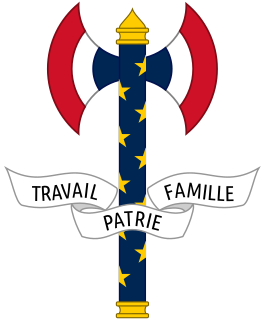Antisemitism in Christianity is the hostility of Christian Churches, Christian groups, and by Christians in general to Judaism and the Jewish people.
Biologically, a child is a human being between the stages of birth and puberty, or between the developmental period of infancy and puberty. The legal definition of child generally refers to a minor, otherwise known as a person younger than the age of majority.
A moral panic is a feeling of fear spread among many people that some evil threatens the well-being of society. It is "the process of arousing social concern over an issue – usually the work of moral entrepreneurs and the mass media".
Religious antisemitism is aversion to or discrimination against Jews as a whole based on religious beliefs, false claims against Judaism and religious antisemitic canards. It is sometimes called theological antisemitism.
Sexual violence is any sexual act or attempt to obtain a sexual act by violence or coercion, acts to traffic a person or acts directed against a person's sexuality, regardless of the relationship to the victim. It occurs in times of peace and armed conflict situations, is widespread and is considered to be one of the most traumatic, pervasive, and most common human rights violations.

The Drancy internment camp was an assembly and detention camp for confining Jews who were later deported to the extermination camps during the German military administration of Occupied France during World War II. It was located in Drancy, a northeastern suburb of Paris, France. Between 22 June 1942, and 31 July 1944, during its use as an internment camp, 67,400 French, Polish, and German Jews were deported from the camp in 64 rail transports, which included 6,000 children. Only 1,542 prisoners remained alive at the camp when the German authorities in Drancy fled as Allied forces advanced and the Swedish Consul-General Raoul Nordling took control of the camp on 17 August 1944, before handing it over to the French Red Cross to care for the survivors.

Pornography in Europe has been dominated by a few pan-European producers and distributors, the most notable of which is the Private Media Group that successfully claimed the position previously held by Color Climax Corporation in the early 1990s. Most European countries also have local pornography producers, from Portugal to Serbia, who face varying levels of competition with international producers. The legal status of pornography varies widely in Europe; its production and distribution are illegal in countries such as Ukraine, Belarus and Bulgaria, while Hungary is noted for having liberal pornography laws.
Public morality refers to moral and ethical standards enforced in a society, by law or police work or social pressure, and applied to public life, to the content of the media, and to conduct in public places. A famous remark of Mrs Patrick Campbell, that she did not care what people did as long as they "didn't frighten the horses" shows that in some sense even high tolerance expects a public limitation on behaviour. At the opposite extreme a theocracy may equate public morality with religious instruction, and give both the equal force of law.

The Parti Populaire Français was a French fascist and anti-semitic political party led by Jacques Doriot before and during World War II. It is generally regarded as the most collaborationist party of France.
Robert Owen Paxton is an American political scientist and historian specializing in Vichy France, fascism, and Europe during the World War II era.

The Vel' d'Hiv' Roundup was a Nazi-directed raid and mass arrest of Jews in Paris by the French police, codenamed Opération Vent printanier, on 16 and 17 July 1942. The name "Vel' d'Hiv' Roundup" is derived from the name of the Vélodrome d'Hiver, where a majority of the victims were temporarily confined. The roundup, assisted by French Police, was one of several aimed at eradicating the Jewish population in France, both in the occupied zone and in the free zone. According to records of the Préfecture de Police, 13,152 Jews were arrested, including more than 4,000 children. They were held at the Vélodrome d'Hiver in extremely crowded conditions, almost without food and water and with no sanitary facilities, as well as at the Drancy, Pithiviers, and Beaune-la-Rolande internment camps, then shipped in rail cattle cars to Auschwitz for their mass murder.

Incident at Vichy is a 1964 play by American dramatist Arthur Miller about a group of men detained in Vichy France; and held to wait unknowingly, for what turns out to be their "racial" inspection by German military officers and Vichy French police during World War II. It focuses on the subjects of human nature, guilt, fear, and complicity and examines how the Nazis were able to perpetrate the Holocaust with so little resistance.

Anti-Jewish laws were enacted by the Vichy France government in 1940 and 1941 affecting metropolitan France and its overseas territories during World War II. These laws were, in fact, decrees of head of state Marshal Philippe Pétain, since Parliament was no longer in office as of 11 July 1940. The motivation for the legislation was spontaneous and was not mandated by Germany. These laws were declared null and void on 9 August 1944 after liberation and on the restoration of republican legality.

The Révolution nationale was the official ideological program promoted by the Vichy regime which had been established in July 1940 and led by Marshal Philippe Pétain. Pétain's regime was characterized by anti-parliamentarism, rejection of the constitutional separation of powers, personality cultism, xenophobia, state-sponsored anti-Semitism, promotion of traditional values, rejection of modernity, corporatism and opposition to the theory of class conflict. Despite its name, the ideological project was more reactionary than revolutionary as it opposed most changes introduced to French society by the French Revolution.

Vichy France is the common name of the French State headed by Marshal Philippe Pétain during World War II. Evacuated from Paris to Vichy in the unoccupied "Free Zone" in the southern part of metropolitan France which included French Algeria, it remained responsible for the civil administration of France as well as the French colonial empire.
Religious views on pornography are based on broader religious views on modesty, human dignity, sexuality and other virtues which may not be reflected or may be reduced for humans who practice pornography. Different religious groups view pornography and sexuality differently.
The years leading up to World War II saw great changes in the sexual habits of European societies.
Ashcroft v. Free Speech Coalition, 535 U.S. 234 (2002), is a U.S. Supreme Court case which struck down two overbroad provisions of the Child Pornography Prevention Act of 1996 because they abridged "the freedom to engage in a substantial amount of lawful speech". The case was brought against the Government by the Free Speech Coalition, a "California trade association for the adult-entertainment industry"; along with Bold Type, Inc., a "publisher of a book advocating the nudist lifestyle"; Jim Gingerich, who paints nudes; and Ron Raffaelli, a photographer who specialized in erotic images. By striking down these two provisions, the Court rejected an invitation to increase the amount of speech that would be categorically outside the protection of the First Amendment.
National Socialism, more commonly known as Nazism, is the ideology and practices associated with the Nazi Party—officially the National Socialist German Workers' Party —in Nazi Germany, and of other far-right groups with similar ideas and aims.

The Holocaust in France refers to the persecution, deportation, and annihilation of Jews and Roma between 1940 and 1944 in occupied France, metropolitan Vichy France, and in Vichy-controlled French North Africa, during the World War II. The persecution began in 1940, and culminated in deportations of Jews from France to Nazi concentration camps in Nazi Germany and Nazi-occupied Poland. The deportation started in 1942 and lasted until July 1944. Of the 340,000 Jews living in metropolitan/continental France in 1940, more than 75,000 were deported to death camps, where about 72,500 were killed. The government of Vichy France and the French police participated in the roundup of Jews. Although most deported Jews died, the survival rate of the Jewish population in France was up to 75%, which is one of the highest survival rates in Europe.








